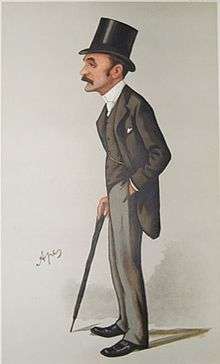Francis Charles Philips

Francis Charles Philips (3 February 1849 – 21 April 1921) was a British army officer, actor, theatre-manager, dramatist, barrister, journalist, short story writer and novelist.[1] He wrote over forty novels and over a dozen plays.
Biography
After education at Sandhurst, Philips became a British army officer, gazetted to the 2nd Queen's Royals shortly before his nineteenth birthday. He served for three years, mainly in Ireland and at Aldershot. After resigning his military commission, he became an actor, first in Liverpool and then in London. In 1880 he began the study of law and was called to the bar in 1884 at the Middle Temple. In 1886 for a paper called Life, Philips wrote a weekly serial entitled Le Journal d'une Mondaine. After the completion of the serial, he endeavoured to have it published in book form. After rejection by five publishing companies, Philips, on the advice of his friend Edward Morton, submitted the work to Ward and Downey. The novel was then published in two volumes under the title As in a Looking Glass. The initial printing sold out in the first three weeks. The novel was then printed in a single volume at a price of six shillings, selling nearly 40,000 copies. It was then published in various editions and was sold in nearly every country in Europe. Philips continued writing popular novels; his three other most successful novels were Jack and Three Jills, The Strange Adventures of Lucy Smith, and Mrs. Bouverie.[2]
In April 1889 Sarah Bernhardt was a success in the role of "Lena Despard", the main character in a French stage adaptation of the novel As in a Looking Glass.[3] Philips wrote many plays. He co-authored the play The Free Pardon with Leonard Merrick.[4] He collaborated with Seymour Hicks on the play Papa's Wife, an adaptation of Philips's story In the Third Capacity.[5]
Due to his friendship with Čedomilj Mijatović, Philips was made Knight Commander of the Order of St. Sava.[6] Philips was twice a widower. By his first wife he had a son. By his second wife he a son and two daughters.[7]
References
- ↑ Harold Pemberton (1906). "F. C. PHILIPS AND HIS WORK". The English Illustrated Magazine. Vol. 34. pp. 605–611.
- ↑ Philips, F. C. (1914). My Varied Life. London: E. Nash. pp. 277–282.
- ↑ "BERNHARDT IN A NEW PLAY.; A GREAT SCENE IN THE THIRD ACT OF "LENA DESPARD."". N Y Times. 17 April 1889.
- ↑ Archer, William (1898). "Review of The Free Pardon". The Theatrical 'World' of 1897. London: Walter Scott, Ltd. pp. 15–17.
- ↑ "PHILIPS, F. C.". Who's Who. Vol. 59. 1907. pp. 1392–1393.
- ↑ "Chapter XI (Chedomile Miyatovich)". My Varied Life. pp. 307–316.
- ↑ "Chapter XI (marriages)". My Varied Life. pp. 317–318.
External links
- Works by Francis Charles Philips at Project Gutenberg
- Works by or about Francis Charles Philips at Internet Archive
|